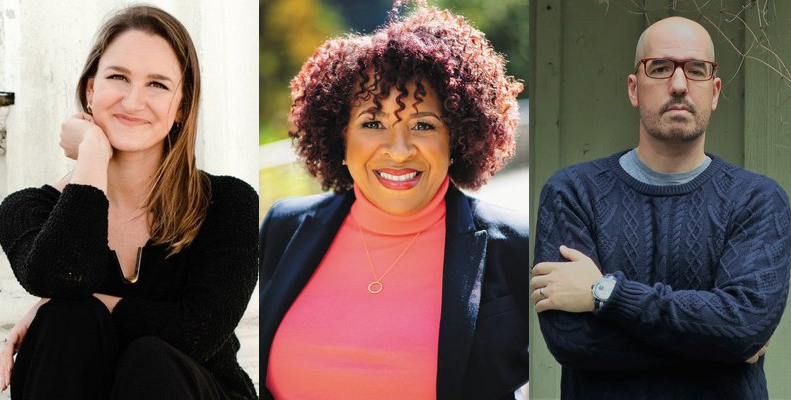Hamptons Whodunit: Authors Go to The Dark Side

It comes with the territory. Arachnologists are constantly asked why they choose to spend their days dissecting spiders and scorpions.
Parachutists get grilled about what compels them to jump out of perfectly good airplanes. And when you get a bunch of crime and mystery writers together in a room, everybody wants to know what lures seemingly well-adjusted people down into the darkest corridors of the human psyche.
Why are we fascinated by the evil that men and women do? That’s one of the questions moderator Abby Endler and her panel plan to explore in Deep in the Dark: Taking Crime Fiction to Its Scariest Places, the opening session of the Hamptons Mystery & Crime Festival, which runs from April 13–16 in East Hampton Village.
“The concept of darkness in crime fiction is what draws so many readers to this genre,” says Endler, a publicist at Penguin Random House and a blogger and crime and mystery superfan who was heavily involved in curating the festival program.
“We have an incredible lineup of authors who are poised to come at this from all different angles. We’ll be looking at the ways darkness can infiltrate families and people, and exploring the concept of darkness from a historical perspective, a social perspective, even the perspective of a horror movie fan.”
The Deep in the Dark session’s eclectic panel includes genre mainstay Riley Sager, newer voices Wanda M. Morris and Stacy Willingham (both of whom recently published their second novels) and Liz Nugent, a bestselling crime writer in her native Ireland.
“These authors are all readers, too — and big fans of the genre,” adds Endler, who will be moderating multiple sessions at the festival. “I’m really interested in hearing about not only what draws them to write about this stuff, but also what draws them to want to read about it.”
Session panelist Wanda M. Morris, whose debut novel, All Her Little Secrets, is being adapted for a one-hour limited series on Showtime, explains that she is drawn to the darkness at least partially because of the corresponding light — in this case, the light of justice — that shines through from the other side of the spectrum.
“My characters always get their just desserts for the dark and twisted things they do in my books,” Morris says. “It’s my way of working out all the unfairness and injustice I see in the world.”
Morris adds that her villains often start out on the page as relatively reasonable human beings. But true to the contours of the genre, the transition from light to darkness is where some of the scariest stuff percolates.
“The human mind and imagination can take you to some awfully dark places,” she notes. “So when I think of being ‘deep in the dark,’ I think of those characters who really scare me because they turn on a dime. They do the most horrific things you would think are possible, but in the beginning, they seem like nice people.”
For some, the lure of the darkness is rooted in environmental factors. Session panelist Liz Nugent, whose new novel, Strange Sally Diamond, is already a bestseller in Ireland and the U.K., believes she became a chronicler of the darker side of humanity in large part because of her experiences as a child and young adult.
Nugent suffered a cerebral hemorrhage when she was young, which hospitalized her for extended periods and cost her the use of her right hand (she types left-handed).
She also endured some very erratic behavior by a “creepy neighbor” who spied on her family and broke into her house several times, once when the family was home. And although she was raised in an upscale suburb of Dublin, she was keenly aware of the difficulties of life in Ireland during her formative years.
“Ireland was kind of a dark and scary place to live in the 1980s when I grew up — especially for women,” Nugent says, ticking off a litany of stressors. “The Church had a real stranglehold on the country at the time. There was no contraception, no abortion, sex outside marriage was forbidden, homosexuality was illegal … and I was also terrified of the threat of nuclear war … Ronald Reagan survived an assassination attempt; so did the pope. Those were all big events in my childhood.”
Nugent and a good number of her colleagues believe that swimming around in the heads of people who do bad things can be a cathartic experience — a perspective shared by many avid readers of the crime genre.
“We get all of our darkness out on the page, so it allows us to be lovely human beings when we’re not working,” she says. “Most of my protagonists are kind of monstrous people, because I write from the point of view of the psychopath or the sociopath. I find it unnervingly easy to get into their heads. But when I close the laptop I can just leave that behind.”
When Nugent says that she leaves the darkness behind when she wraps up her writing session for the day, there’s no reason to doubt her. But it still feels like the door to the basement of her mind is always slightly open, if only just a crack.
“I’m looking at my shelf now and there are six trophies on it — awards I’ve won for my writing,” she says. “They’re all made of glass and they’re all quite heavy. They’d all be brilliant murder weapons.”
Deep in the Dark: Taking Crime Fiction to its Scariest Places is the inaugural session of the Hamptons Mystery & Crime Festival (aka, the Hamptons Whodunit). The session is scheduled for 10 a.m. on Friday, April 14. For tickets and the full schedule of events, visit hamptonswhodunit.com.



